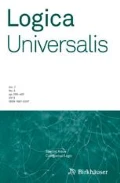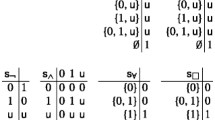Abstract
After observing that the truth conditions of connectives of non–classical logics are generally defined in terms of formulas of first–order logic, we introduce ‘protologics’, a class of logics whose connectives are defined by arbitrary first–order formulas. Then, we introduce atomic and molecular logics, which are two subclasses of protologics that generalize our gaggle logics and which behave particularly well from a theoretical point of view. We also study and introduce a notion of equi-expressivity between two logics based on different classes of models. We prove that, according to that notion, every pure predicate logic with \(k\ge 0\) variables and constants is as expressive as a predicate atomic logic, some sort of atomic logic. Then, we prove that the class of protologics is equally expressive as the class of molecular logics. That formally supports our claim that atomic and molecular logics are somehow ‘universal’. Finally, we identify a subclass of molecular logics that we call predicate molecular logics and which constitutes its representative core: every molecular logic is as expressive as a predicate molecular logic.



Similar content being viewed by others
Notes
I thank Peter Arndt for checking and proving that result.
The definition of molecular connectives and molecular logics of [6] is less general than in the present article, in the sense that it is not possible there to have the same argument at different places in the definition of a molecular connective. This said, it is nevertheless possible to define an appropriate notion of \({\textsf {C}}\)-bisimulation for the more general definition of molecular logics of the present article.
References
Allwein, G., Dunn, M.J.: Kripke models for linear logic. J. Symbol. Logic 58(2), 514–545 (1993)
Arndt, P., Freire, R.A., Luciano, O.O., Mariano, H.L.: A global glance on categories in logic. Logica Universalis 1(1), 3–39 (2007)
Aucher, G.: Displaying Updates in Logic. J. Logic Comput. 26(6), 1865–1912 (2016)
Aucher, G.: Towards universal logic: gaggle logics. J. Applied Logics. 7(6), 875–945 (2020)
Aucher, G.: Selected Topics from Contemporary Logics, chapter Towards Universal Logic: Gaggle Logics, pages 5–73. Landscapes in Logic. College Publications, October (2021)
Aucher, G.: A van Benthem theorem for atomic and molecular logics. In Proceedings of Non-classical logics. Theory and applications. (NCL’22), EPTCS, (2022)
Barwise, J.: Axioms for abstract model theory. Annal. Math. Logic 7(2), 221–265 (1974)
Béziau, J-Y.: Logica universalis, chapter from consequence operator to universal logic: a survey of general abstract logic. Birkhäuser Basel, (2007)
Béziau, J.-Y.: Editorial: Introduction to the universal logic corner. J. Log. Comput. 19(6), 1111 (2009)
Bimbo, K., Dunn, M.J.: Generalized galois logics: relational semantics of nonclassical logical calculi. number 188. center for the study of language and information, (2008)
Chang, C.C., Keisler, H.J.: Model theory. studies in logic and the foundations of mathematics. Elsevier, Amsterdam (1998)
Dunn, M.J.: Gaggle theory: an abstraction of galois connections and residuation, with applications to negation, implication, and various logical operators. European workshop on logics in artificial intelligence. Springer, Berlin Heidelberg (1990)
Dunn, M.J.: Philosophy of language and logic, of philosophical perspectives, chapter perp and star two treatments of negation. Ridgeview Publishing Company, USA (1993)
Dunn, M.J., Hardegree, G.M.: Algebraic methods in philosophical logic in oxford logic guides. Clarendon Press, Oxford (2001)
Dunn, M.J., Zhou, C.: Negation in the context of gaggle theory. Studia Logica 80(2–3), 235–264 (2005)
Enderton, H.: An introduction to mathematical logic. Academic Press, USA (2001)
Gabbay, D. (ed.): What is a logical system?. Studies in logic and computation. Oxford University Press, USA (1994)
Gabbay, D.: Labelled deductive systems. Oxford University Press, USA (1996)
Garcia-Matos, M., Väänänen, J.: Abstract model theory as a framework for universal logic. In Jean-Yves Béziau, editor, Logica Universalis, pages 19–33, Basel, (2007). Birkhäuser Basel
Goguen, J.A., Burstall, R.M.: Institutions: Abstract model theory for specification and programming. J. ACM (JACM) 39(1), 95–146 (1992)
Goldblatt, R.: Semantic analysis of orthologic. J. Phil. Logic 3, 19–35 (1974)
Goré, R.: Substructural logics on display. Logic J. IGPL 6(3), 451–504 (1998)
Grishin, V.: On a generalization of the Ajdukiewicz-Lambek system. In: Mikhailov, A.I. (ed.) Studies in nonclassical logics and formal systems, pp. 315–334. Nauka, Moscow (1983)
Janin D., Lenzi G.: Relating levels of the mu-calculus hierarchy and levels of the monadic hierachy. In: LICS, pages 347–356, Boston, United States, IEEE computer society (2001)
Kripke, S.A.: Semantical analysis of modal logic, i: normal propositional calculi. Zeitschrift für Mathematische Logik und Grundlagen der Mathematik 8, 113–116 (1963)
Kripke, S.A.: Formal Systems and Recursive Functions, chapter semantical analysis of intuitionistic logic, I, pages 92–130. North Holland, Amsterdam, (1965)
Kuhn, S.T.: Quantifiers as modal operators. Studia Logica 39(2), 145–158 (1980)
Lambek, J.: The mathematics of sentence structure. Am. Math. Monthly 65, 154–170 (1958)
Marx, M., Venema, Y.: Multi-dimensional Modal Logic, volume 4 of Applied logic series. Kluwer (1997)
Meseguer, J.: General logics. In: Ebbinghaus, H.-D., Fernandez-Prida, J., Garrido, M., Lascar, D., Rodriquez Artalejo, M. (eds.) Logic Colloquium’87, of studies in logic and the foundations of mathematics. Elsevier, Amsterdam (1989)
Moortgat, M.: Symmetries in natural language syntax and semantics: the lambek-grishin calculus in logic, language information and computation. Springer, Cham (2007)
Moss, L.S.: Applied logic: a manifesto. mathematical problems from applied logic I. Springer, Cham (2006)
Mossakowski, T., Diaconescu, R., Tarlecki, A.: What is a logic translation? Logica Universalis 3(1), 95–124 (2009)
Mossakowski, T., Goguen, J., Diaconescu, R., Tarlecki, A.: What is a logic? In: Beziau, J.-Y. (ed.) Logica Universalis, pp. 111–133. Basel, Birkhäuser (2007)
Olkhovikov, G.K.: On expressive power of basic modal intuitionistic logic as a fragment of classical FOL. J. Appl. Log. 21, 57–90 (2017)
Priest, G.: An introduction to non-classical logic. Cambridge University Press, USA (2011)
Prior, A.: Past, present and future. Clarendon Press, Oxford (1967)
Restall, G.: An introduction to substructural logics. Routledge, UK (2000)
Rotman, J.J.: An introduction to the theory of groups. graduate texts in mathematics. Springer, New York (1995)
Sambin, G., Battilotti, G., Faggian, C.: Basic logic: reflection, symmetry, visibility. J. Symbol. Logic 65(03), 979–1013 (2000)
Väänänen, J.: Second-order and higher-order logic. In: Edward, N., Zalta, editor, The stanford encyclopedia of philosophy. metaphysics research lab, Stanford University, Fall 2021 edition, (2021)
Author information
Authors and Affiliations
Corresponding author
Additional information
Publisher's Note
Springer Nature remains neutral with regard to jurisdictional claims in published maps and institutional affiliations.
This paper is the winner of the Louis Couturat Logic Prize 2021 (France)
Rights and permissions
About this article
Cite this article
Aucher, G. On the Universality of Atomic and Molecular Logics via Protologics. Log. Univers. 16, 285–322 (2022). https://doi.org/10.1007/s11787-022-00298-5
Received:
Accepted:
Published:
Issue Date:
DOI: https://doi.org/10.1007/s11787-022-00298-5




